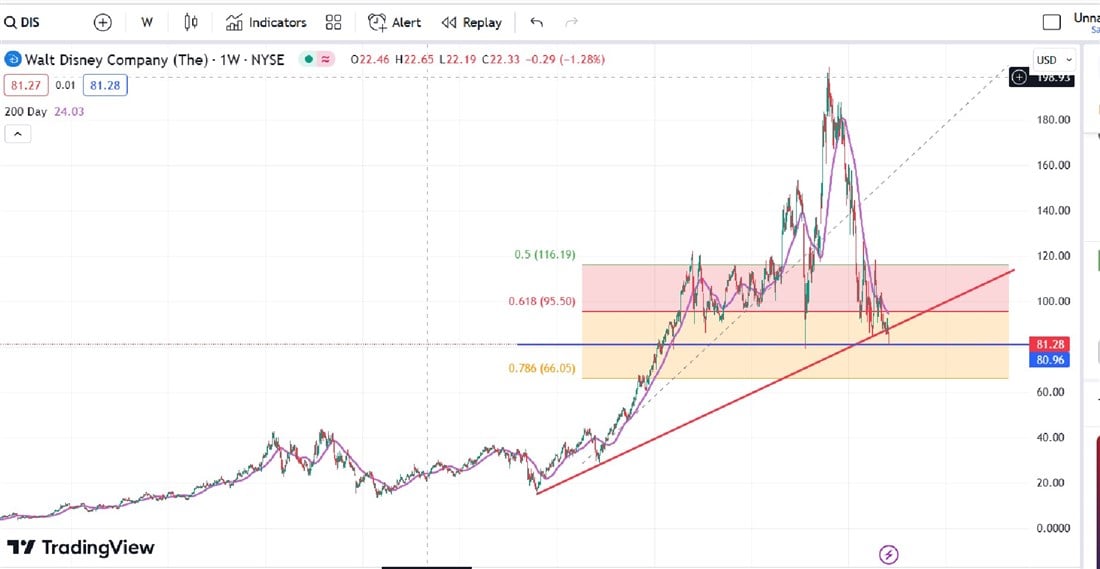If any reasonable investor were told that Walt Disney NYSE: DIS would underperform the S&P 500 by as much as 41.8% during the past twelve months, such a claim would have been thought to be as crazy as apples falling upward from a tree. Well, today apples are falling upward.
Disney stock has fallen by more than 60% from its all-time high price of $203 a share in 2021. Despite the effects that the COVID-19 pandemic had on the company's theme park segment, markets still rewarded the stock with a massive rally.
Today, when the macro economy looks ten times better than back then, markets are ignoring the stock unjustifiably. There is one reason to be cautious about the company's current financial situation. However, management is assessing this one to bring the stock back to its glory days.
Bottoming Out
Looking at Disney's stock chart, there are several indicating factors that this company will soon experience a potential turnaround; any such event is sure to carry a set of fundamental drivers, though it would be wise to assess reasonable entry points for now.

Starting with the holy grail of the Fibonacci retracements, Disney has fallen into the 'golden ratio' between 61.8% and 78.6% retracement from highs. Further, as exemplified by the thick red line, Disney stock is enjoying a robust uptrend support line, which may pull the stock back to the mid $80s a share immediately.
Analyst ratings remain bullish despite the price behavior, as typically, analysts will hide their optimism away so as not to fight the current chart trends. With a consensus price target of $116.8 a share, investors have a potential 43.5% upside from today's prices to close the value gap.
These targets must be reflecting a major pivot inside the company's multi-quarter margin contraction, investors will be pleased to find that there is much more than jus a 'return to historical profits' story inside of Disney.
Financial Comeback
COVID-19 has transformed Disney's financials up to today. However, the past will serve as a significant benchmark to give investors a rough idea of what management is working to bring back.
A business like Disney, which owns a valuable brand name, must reflect some moat around its margins as it can command price dynamics and other input costs. Disney's gross margins in 2017 were 45%, compared to today's 34.2%; digest that and then return for more.
Net income drives shareholder returns and saw its margins contract significantly. From a high of 22% in 2018 to today's 4.2%, net income margins at Disney are symptoms of bad decisions along the way or perhaps a delayed recovery from COVID's craze.
In 2019, Disney began investing heavily in its new streaming branch in Disney +. Acquisitions and investment into these segments brought investing cash flows (as a percentage of operating cash flows) to more than 80% when they only represented a much smaller budget of less than 30% in 2019.
Perhaps markets were not ready for the slow ramp-up to profitability that this new business would represent, as nearly five years later, the streaming segment is still bringing in net losses for the company. However, not everything is bad news.
According to the latest quarterly earnings presentation, Disney's streaming business grew 9% in revenues while also narrowing its net loss from $700 million to $500 million. Moreover, active subscribers grew by 1.4 million in the quarter, showcasing the increasing market share the service is commanding.
The streaming business seems to be slowly making its way into economies of scale, which would bring on a bottom-line breakeven or a potential profit. Meanwhile, theme parks are bringing home the growth bacon.
International parks, namely Hong Kong and Shanghai, brought the company an annual revenue jump of 94% to showcase Asia's economic giant benefiting from reopening and monetary stimulus. Domestic parks grew revenues by 4% on a steady rise, netting a combined growth of 13% for the segment.
Upside Potential
It is understood that because of its size, Disney is not a company that is expected to bring sizable growth in its bottom-line earnings per share. However, analysts expect some of these financial improvements to get a massive jump in the next twelve months.
Analysts are shooting for a 41.8% advance in EPS, which is baffling for a company like Disney. All else equal, the stock price should reflect a similar-sized move since EPS typically drives a stock's valuation via its price.
One other colossal breakout can come from the reinstatement of the company's dividend, which was decided to be cut during the pandemic to fund investments in the new streaming businesses and cushion any shortcomings from park closures.
Investors need to see a comeback in the company's free cash flows (operating cash flows minus capital expenditures) since these funds are the primary source of capital used to pay dividends and fund other programs like share buybacks.
During the same quarter a year ago, Disney brought in a negative free cash flow of $317 million, whereas today, that number looks more like $1.5 billion, making a clear path for management to consider paying its shareholders once again.
Before you consider Walt Disney, you'll want to hear this.
MarketBeat keeps track of Wall Street's top-rated and best performing research analysts and the stocks they recommend to their clients on a daily basis. MarketBeat has identified the five stocks that top analysts are quietly whispering to their clients to buy now before the broader market catches on... and Walt Disney wasn't on the list.
While Walt Disney currently has a Moderate Buy rating among analysts, top-rated analysts believe these five stocks are better buys.
View The Five Stocks Here
Market downturns give many investors pause, and for good reason. Wondering how to offset this risk? Enter your email address to learn more about using beta to protect your portfolio.
Get This Free Report